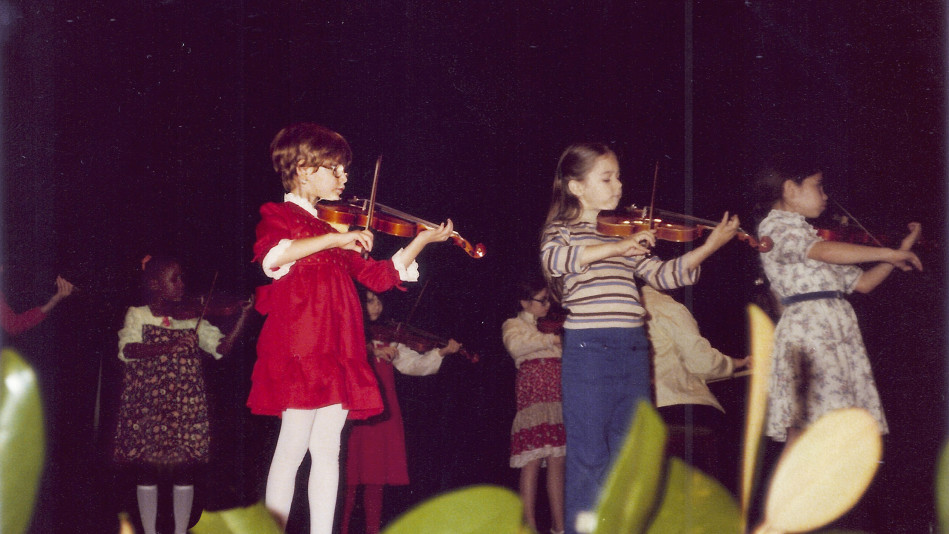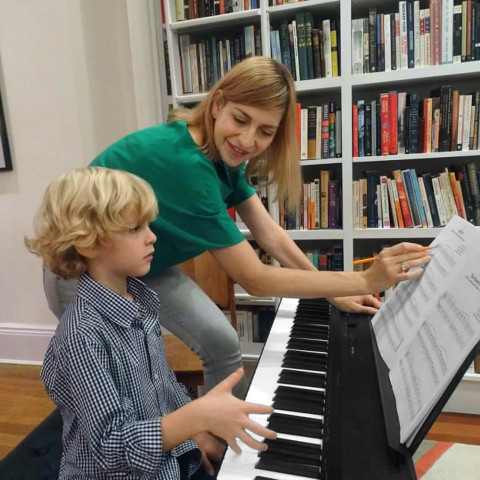The Best and Worst of My Musically Inclined Mother
Making music with her mother was a discordant affair. Could Julie Orringer change the tune?

Photo: Agnes Orringer
My mother sang constantly: Judy Collins in the car, Woody Guthrie as she bathed me. She owned hundreds of records and a violin she rarely played; she'd been in the junior high orchestra, but her parents couldn't afford private instruction. When I turned 6, she signed me up for violin lessons. aI was thrilled. She'd bought me a ticket to her own special province.
At practice time, we'd stand in the living room, her hand around mine on the bow. A well-played measure, and her face radiated approval; a missed note, and her mouth tightened. When I cried, my tears infuriated her: She wanted me to love this. She was giving me what she couldn't have.
Soon my brother and sister were struggling along with me in the living room. Those rare times when we actually made music, my mother was ecstatic. When she was diagnosed with breast cancer and had to undergo treatment, violin became a kind of medicine: It got her off the bathroom floor so she could take us to lessons. But now we were even more terrified of playing a wrong note. During a bad practice session, she'd sometimes say, "You're killing me."
By the end of high school, I knew I'd gone as far as I could with the violin. To my surprise, my mother didn't protest. She'd given me what she'd wanted: the chance to try. But any liberation I might have felt was obliterated by the recurrence of her cancer. She'd fought it; it came back. She died when I was 20, on Mother's Day.
Seventeen years later, I'm driving across Brooklyn with my 3-month-old son, Jacob. I sing to him, and he sings back, matching my pitch. I try again. He matches again. At 2, in the bathtub, he belts out I'm singin' in the rain! like Gene Kelly. At 4, he picks out songs on the piano and begs for lessons.
For a year I stall. I have nightmares in which I shout at him as he plays. When I hear of other kids taking lessons, I feel envy and dread. Finally, I call a teacher recommended by a friend. My son is eager to play, I tell her, but my own relationship with music is complicated.
"We'll just have fun," she says.
Jacob loves it all: scales, rhythm, theory. He learns new songs quickly, asks for more and more. Every time we practice, I feel an undertow of anxiety. I'm afraid I'll care too much.
Then, when he decides to play a Bach Musette for a recital, material beyond his reach, he grows frustrated; he can envision the music, but his hands aren't big or quick enough to play it. On Mother's Day, he refuses to practice.
"But what if you can't play the Musette for your recital?" I ask.
"I don't care," he says. "I hate practicing. I hate you."
"All right, then," I say, angry now. "No more lessons!"
To my horror—though what did I expect?—his eyes fill with tears. He stomps away from the piano, and my husband suggests I take a walk. I go outside and call my sister.
"I'm ruining music for him," I say. "It's just like when we were kids."
"You had a tough practice," she says. "That doesn't mean he's going to give up. You didn't, even after what we went through."
"Didn't I?"
My sister laughs. "No, you're the one who signed Jacob up for lessons. You practice with him every day. No one's making you. You do it on your own."
But that's not entirely true. My mother's been with me all this time. I was thinking about her when I sang to my son, and when I watched him pick out his first tunes. I think about her when we practice—about the times she shouted, but also about the moments when my playing thrilled her. I can't forget any of it, bad or good. And I don't want to. She was my mother, in all her complexity.
The next day, Jacob and I devise a strategy: He'll play the right hand, I'll play the left. We sit at the piano, and the two halves of the piece fall together. My hand can span the bass octave; his is quick enough to find the treble melody. I feel the delight moving through his body: He's doing it. We're doing it. And my mother is with us, and will be, every time we make music together.
Julie Orringer is the author of, most recently, the novel The Invisible Bridge.
Photo above courtesy of Ryan Harty.
Want more stories like this delivered to your inbox? Sign up for the Oprah.com Relationships Newsletter!
At practice time, we'd stand in the living room, her hand around mine on the bow. A well-played measure, and her face radiated approval; a missed note, and her mouth tightened. When I cried, my tears infuriated her: She wanted me to love this. She was giving me what she couldn't have.
Soon my brother and sister were struggling along with me in the living room. Those rare times when we actually made music, my mother was ecstatic. When she was diagnosed with breast cancer and had to undergo treatment, violin became a kind of medicine: It got her off the bathroom floor so she could take us to lessons. But now we were even more terrified of playing a wrong note. During a bad practice session, she'd sometimes say, "You're killing me."
By the end of high school, I knew I'd gone as far as I could with the violin. To my surprise, my mother didn't protest. She'd given me what she'd wanted: the chance to try. But any liberation I might have felt was obliterated by the recurrence of her cancer. She'd fought it; it came back. She died when I was 20, on Mother's Day.
Seventeen years later, I'm driving across Brooklyn with my 3-month-old son, Jacob. I sing to him, and he sings back, matching my pitch. I try again. He matches again. At 2, in the bathtub, he belts out I'm singin' in the rain! like Gene Kelly. At 4, he picks out songs on the piano and begs for lessons.
For a year I stall. I have nightmares in which I shout at him as he plays. When I hear of other kids taking lessons, I feel envy and dread. Finally, I call a teacher recommended by a friend. My son is eager to play, I tell her, but my own relationship with music is complicated.

"We'll just have fun," she says.
Jacob loves it all: scales, rhythm, theory. He learns new songs quickly, asks for more and more. Every time we practice, I feel an undertow of anxiety. I'm afraid I'll care too much.
Then, when he decides to play a Bach Musette for a recital, material beyond his reach, he grows frustrated; he can envision the music, but his hands aren't big or quick enough to play it. On Mother's Day, he refuses to practice.
"But what if you can't play the Musette for your recital?" I ask.
"I don't care," he says. "I hate practicing. I hate you."
"All right, then," I say, angry now. "No more lessons!"
To my horror—though what did I expect?—his eyes fill with tears. He stomps away from the piano, and my husband suggests I take a walk. I go outside and call my sister.
"I'm ruining music for him," I say. "It's just like when we were kids."
"You had a tough practice," she says. "That doesn't mean he's going to give up. You didn't, even after what we went through."
"Didn't I?"
My sister laughs. "No, you're the one who signed Jacob up for lessons. You practice with him every day. No one's making you. You do it on your own."
But that's not entirely true. My mother's been with me all this time. I was thinking about her when I sang to my son, and when I watched him pick out his first tunes. I think about her when we practice—about the times she shouted, but also about the moments when my playing thrilled her. I can't forget any of it, bad or good. And I don't want to. She was my mother, in all her complexity.
The next day, Jacob and I devise a strategy: He'll play the right hand, I'll play the left. We sit at the piano, and the two halves of the piece fall together. My hand can span the bass octave; his is quick enough to find the treble melody. I feel the delight moving through his body: He's doing it. We're doing it. And my mother is with us, and will be, every time we make music together.
Julie Orringer is the author of, most recently, the novel The Invisible Bridge.
Photo above courtesy of Ryan Harty.
Want more stories like this delivered to your inbox? Sign up for the Oprah.com Relationships Newsletter!



